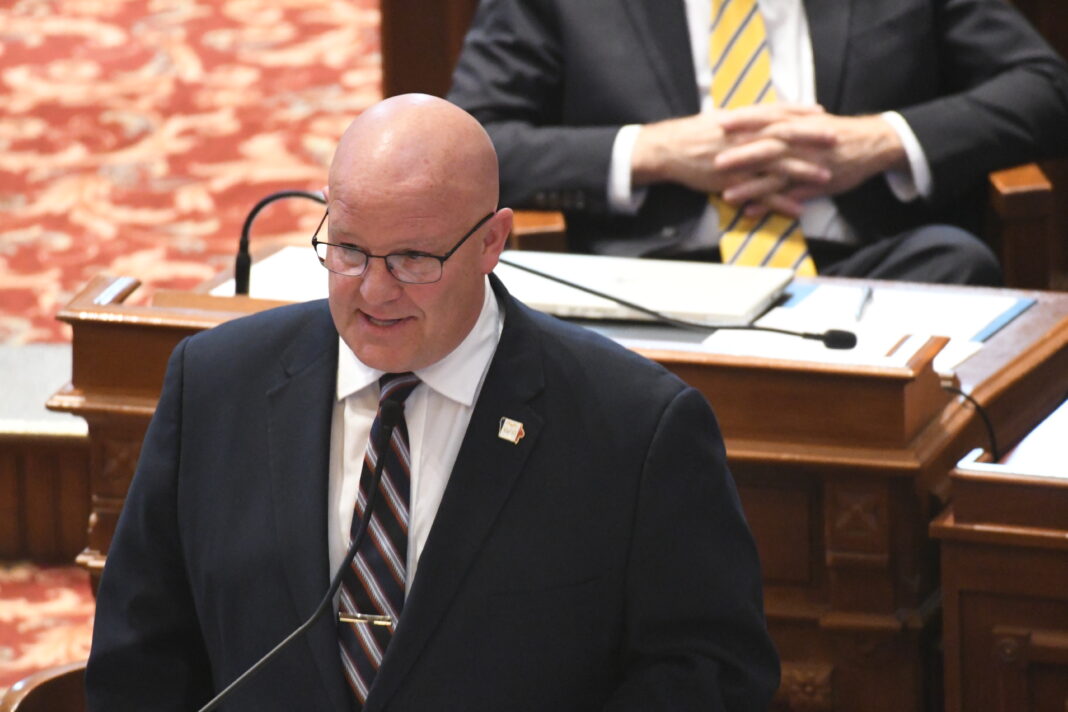Iowa moved one step closer to adopting a Religious Freedom and Restoration Act on Tuesday as the Iowa Senate voted 31-16 to advance RFRA. The bill strengthens Iowans’ ability to exercise their sincerely held religious beliefs and is already law in 25 states as well as at the federal level.
According to Religious Liberty in the States, Iowa ranks 33rd for religious liberty.
The federal version of RFRA was passed in 1993 when it was offered by Democrats Chuck Schumer and Ted Kennedy. President Bill Clinton signed it into law.
Republican State Sen. Jason Schultz managed the bill during Tuesday’s debate. Schultz said the proposal simply allows three things:
*First, it provides a cause of action for someone who believes their religious freedoms have been infringed upon to have a day in court.
*Second, it requires the state to prove a compelling interest in restricting the religious freedom of the individual.
*Third, if the compelling interest test is satisfied then the remedy must be in the least restrictive means possible.
The federal RFRA was spurred by a ruling from the United States Supreme Court in 1990. Schultz said ironically it was a decision written by Justice Antonin Scalia that he disagreed with. Scalia wrote that religious protections do not apply to rules of general applicability.
Three years later the Democrat trifecta in Washington passed the federal RFRA and signed it into law. At the time it was praised as a remarkable example of bipartisanship that included Democrats, Republicans, evangelicals, representatives of Islam, the Church of Jesus Christ of Latter-Day Saints, the ACLU and other various political factions to secure religious freedom.
Schultz added that the federal RFRA was intended to also apply to states, but a 1997 court decision undid that, forcing states to enact their own version.
Connecticut and Rhode Island passed their state versions prior to that 1997 decision, but since then 23 other states have enacted such a law. The list includes both red and blue states:
Connecticut, Rhode Island, Florida, Illinois, Alabama, Arizona, South Carolina, Texas, Idaho, New Mexico, Oklahoma, Missouri, Pennsylvania, Tennessee, Louisiana, Kansas, Kentucky, Mississippi, Arkansas, Indiana, Montana, South Dakota, Virginia, West Virginia and North Dakota.
Legislation is moving through the process in Utah as well as Iowa.
“It is time for Iowa to add a Religious Freedom and Restoration Act to our code,” Schultz said at the conclusion of his opening remarks.
Democrat State Sen. Herman Quirmbach spoke against the bill, noting that he believes “bigotry dressed up in religious robes is still bigotry.” Americans are allowed to believe anything they want, he said, no matter how hateful or hurtful those beliefs are, but this bill allows Iowans to actually act on their beliefs, and that is wrong.
“The bill essentially says you can make up your own religion,” Quirmbach said. “You can tailor it as you wish.”
Quirmbach said the line must be drawn with people bringing their views into the public marketplace. He said businesses that refuse to serve someone at a lunch counter, or someone refusing to rent an apartment or sell a home to someone are “infringing on their right to acquire property.”
“Many of the tenants of many religions, I think it must be admitted, are more reflective of social customs rather than divine inspiration,” Quirmbach said. “This bill opens the door to all forms of discrimination.”
Democrat State Sen. Claire Celsi highlighted opposition to the bill from the business community. She noted the Cedar Rapids Metro Economic Alliance, City of Iowa City, Krause Group, Marshalltown Area Chamber of Commerce, Technology Association of Iowa, Iowa Chamber Alliance, Principal Financial Group and others are all opposed to RFRA.
Celsi said if the legislature truly wants to spur economic growth and help the workforce shortage, RFRA sets those goals back.
Democrat State Sen. Sarah Trone Garriott said the original intent of the federal RFRA was good, but individuals and groups have now used laws like it to discriminate and “justify bad behavior.” Trone Garriott, who said she is a Christian and religious, added she is confused because to her the motivation of people who want RFRA to become law in Iowa do not seem to have “religious motivation.”
Democrat State Sen. Molly Donahue discussed RFRA being used in Utah by the church to utilize child labor and not cooperate with an investigation. Donahue said it took more than a decade to get answers and hold the church accountable, but it was eventually ordered to pay nearly $1 million for violating child labor laws.
Democrat State Sen. Zach Wahls asked Schultz for examples of Iowans having their ability to exercise their faith restricted. Schultz shared examples from across the country where RFRA has been successfully used but didn’t include any examples from Iowa. When pressed, Schultz cited the inability to go to church during the COVID “overreaction.”
“I literally couldn’t go to my church,” Schultz said. “I had to make special provisions to have communion. We saw that as a gross infringement.”
Wahls thanked Schultz for the example and said many of the instances Schultz talked about could have been successfully addressed by an amendment offered by Democrat State Sen. Janice Weiner, but Republicans defeated it.
“If this bill was only about restoring religious freedom, our Republican colleagues would have accepted common-sense amendment,” Wahls said. “This legislation is not about restoring religious freedom at all. This legislation is about allowing some people to cite their religious beliefs to violate the basic civil rights protections that all Iowans benefit from. This bill is a direct assault on the basic idea of equal protection under the law.”
Instead, the bill codifies the “right to discrimination.”
“This legislation is just the latest in a long and exhausting line of bills that will make it more difficult for lesbian, gay, bisexual, transgender and other queer Iowans to live, work and raise a family in this state,” Wahls said. “We know that because we have seen how these laws are used in other states.”
Democrat State Sen. Liz Bennett said she is proud to be both a queer woman and an Iowan.
“I am sick and tired of my community being the target of mean-spirited, discriminatory bills written by Republican politicians,” she said.
Bennett expressed concerns about being able to go out to eat with someone she loves and having to endure questions from the owner of the restaurant related to their relationship and potentially being told to leave. She has similar concerns about healthcare coverage and employment protections.
“What about my rights,” she asked. “What about my right to seek life, liberty and the pursuit of happiness? What about my rights or my freedom to do the same things as everybody else? This bill is a license to discriminate. This is a radical attempt to go around the protections and public accommodations used to create a world where a person can freely participate without being discriminated against in daily life based on race, sex, sexual orientation or gender identity.”
Bennett closed by saying anyone who votes for the bill is keeping company with people who have used religion to justify slavery, segregation, child marriage, spousal rape and ban interracial marriage.
“Do better,” she said. “Vote no.”
Republican State Sen. Jeff Taylor said the bill is not about any of the “terrible things” Democrats brought up during the debate. And, he added, it isn’t about discrimination. Instead, it is an effort to restore what the First Amendment already makes clear.
“It’s not an accident freedom of religion is the very first part of the First Amendment,” he said. “Your argument is really with the Constitution, It’s not with this bill.”
Taylor said courts have used commonsense when it comes to restricting free exercise of religion, as well as other freedoms. But he said laws created by the government should be in conformity with the Constitution rather than expecting the Constitution to bend to newly created laws.
“The Constitution is foundational law – that is the most basic law we have,” he said. “It is literally the law of the land. It should not be forced to conform to all of the myriad laws and regulations that the government at every level has created through the decades.”
Taylor also pointed out that while Democrats seem to be focused on conservative Christians receiving protection from RFRA, the same RFRA being passed will also protect liberal Christians and religious minorities such as Muslims and Hindus.
Schultz closed by noting the Democrat debate was “dramatic.” He said the need for RFRA hasn’t changed in the last 30 years, but the political motivations of Democrats have, which is why they now oppose RFRA.
“This bill only does three things,” he said. “It gives cause of action to go to court, it gives the court instructions to apply a compelling interest test and if there is a compelling interest it must be the least restrictive means possible. That’s all this does.”
RFRA has never been used to discriminate against LGBTQ individuals, Schultz said. And while some bad actors have used it as a defense, it doesn’t mean they were successful.


















Exodus 20:1-17
King James Version
20 And God spake all these words, saying,
2 I am the Lord thy God, which have brought thee out of the land of Egypt, out of the house of bondage.
3 Thou shalt have no other gods before me.
4 Thou shalt not make unto thee any graven image, or any likeness of any thing that is in heaven above, or that is in the earth beneath, or that is in the water under the earth.
5 Thou shalt not bow down thyself to them, nor serve them: for I the Lord thy God am a jealous God, visiting the iniquity of the fathers upon the children unto the third and fourth generation of them that hate me;
6 And shewing mercy unto thousands of them that love me, and keep my commandments.
7 Thou shalt not take the name of the Lord thy God in vain; for the Lord will not hold him guiltless that taketh his name in vain.
8 Remember the sabbath day, to keep it holy.
9 Six days shalt thou labour, and do all thy work:
10 But the seventh day is the sabbath of the Lord thy God: in it thou shalt not do any work, thou, nor thy son, nor thy daughter, thy manservant, nor thy maidservant, nor thy cattle, nor thy stranger that is within thy gates:
11 For in six days the Lord made heaven and earth, the sea, and all that in them is, and rested the seventh day: wherefore the Lord blessed the sabbath day, and hallowed it.
12 Honour thy father and thy mother: that thy days may be long upon the land which the Lord thy God giveth thee.
13 Thou shalt not kill.
14 Thou shalt not commit adultery.
15 Thou shalt not steal.
16 Thou shalt not bear false witness against thy neighbour.
17 Thou shalt not covet thy neighbour’s house, thou shalt not covet thy neighbour’s wife, nor his manservant, nor his maidservant, nor his ox, nor his ass, nor any thing that is thy neighbour’s.
Republican State Sen. Jeff Taylor did a thorough job of pointing the opposition to the Constitution. It actually does protect our rights and that is where we must start. Always.